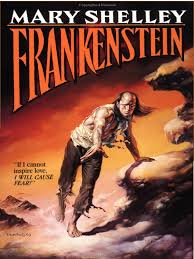
Frankenstein by Mary Shelley is a classic. Written by the teen daughter of a proud women’s rights activist as part of a competition against a pretentious Lord, it tells the story of Victor Frankenstein and his quest to build a person. Spoilers for the novel follow.
Victor, an undergraduate dropout, decides shortly after starting university that he knows everything about life and science that there is to learn. Overconfident and determined, he uses parts of dead people to create a new one. When he brings the creature to life, Frankenstein is overjoyed at his success. Soon, though, his joy sours as the creature, horrifying and brutish, and ends up killing almost every character in the story. Victor chases the monster for much of the novel, realizing the mistake he made by creating something so dangerous without considering the consequences. Victor dies in the end, and the creature leaves, having lost its mission, and the final, resounding lesson of the narrative is to find “happiness in tranquility and avoid ambition.”
This thrilling tale is unorthodox in a variety of ways. Most obviously, it is a horror story written by a female, a very uncommon feat. It combines elements of the gothic and romantic movements, and the details of geography are remarkable because of their resemblance to real places. Frankenstein is often considered the first science fiction work due to the chemistry and biology behind the creation, and the story’s use of laboratory experiments.
The novel itself is renowned for its unique storytelling and plot–the first of its kind though it has since been redone and repeated a million times. Shelley notably refuses to name the creature that Frankenstein creates, choosing to refer to him as “creature”, “monster”, “beast”, and several other rude names to create the idea of a missing identity. The ethical and moral questions it raises still apply to us today in the research of AI and cloning. Every plot twist and character has a special message, one that reaches beyond the narrative to tell the reader about the graveness of an inflated ego.
Mary Shelley’s Frankenstein is a remarkable thriller sure to entertain anyone, from the casual reader to the serious literary critic.
